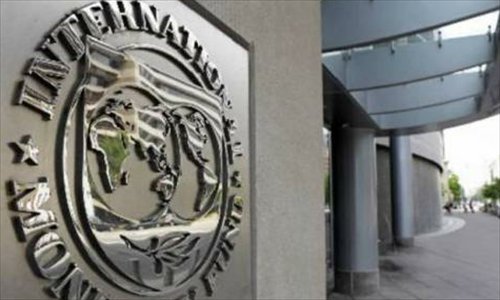IMF to revise down Asia and Pacific growth forecast amid mounting COVID-19 fallout
Source:Xinhua Published: 2020/6/10 13:32:51

The International Monetary Fund (IMF) is expected to revise down the growth forecast for the Asia and Pacific region in an update to its World Economic Outlook (WEO) later this month, a senior IMF official said Tuesday.
"First quarter GDP (gross domestic product) growth turns mostly on the downside, with high-frequency indicators for April and May point to severe disruptions in the second quarter. China appears to be the main exception," IMF First Deputy Managing Director Geoffrey Okamoto told reporters at a virtual roundtable.
"Some countries also have had difficulty containing the pandemic spread, which has implications for their own economic outlook," said Okamoto, whose appointment as the multilateral lender's second-highest ranking official took effect in March.
Noting that the IMF is going to release an update to the WEO on June 24, Okamoto said "we expect to revise down materially reflecting the mainly longer-than-expected lockdowns and increasingly negative global trade spillovers, partially offset by large stimulus in several countries."
In the latest WEO report released in April, the IMF projected growth in Asia to stall at zero percent in 2020 due to the COVID-19 pandemic, the lowest growth since the 1960s. China is expected to see moderate growth of 1.2 percent, according to the report.
In response to a question from Xinhua, the IMF first deputy managing director said at the roundtable that one thing China benefited from was "very clear, decisive action early on" to curb the spread of the novel coronavirus, and also "acting very quickly to put in place the policy support measures that would allow things to stabilize."
Noting that China is in the cycle a little bit earlier than other countries, Okamoto voiced hope that more countries will "end up in this category as time goes on," and other economies could follow an "upward trend" in a few months.
"Obviously we're still in the thick of this, and in many areas, there are economies that are just starting to reopen as we speak. And some of them haven't yet. So it's too early to judge for many of them," Okamoto said.
Changyong Rhee, director of the IMF's Asia and Pacific Department, who also joined the roundtable, said as China implemented and started to ease lockdown policy a lot earlier, China's first quarter performance was in line with IMF expectation, but for many other Asian economies, the first quarter numbers were worse than expected.
For the second quarter, Rhee said that China also "cannot be immune from" the global trade slowdown, while noting that China's economy seems to "turn around" in general, even though at a low level.
In its latest Global Economic Prospects released Monday, the World Bank Group said growth in East Asia and Pacific is projected to fall to 0.5 percent in 2020, the only region that could see growth this year, and economic activity in South Asia is projected to contract by 2.7 percent.
"On economic policies, we believe a full arsenal is needed to respond to the pandemic shock," Okamoto said at the virtual roundtable. "Difficult choices lie ahead for countries that don't have enough policy space and immediate priority is to raise health spending to contain the virus and slow contagion."
"If fiscal space is unavailable, expenditures should be reallocated to health," said the senior IMF official. "For countries with ample resources, there is scope to do more, particularly on policies to prevent long-term damage or scarring to the livelihoods of the least advantaged in society."
Noting that Asian policymakers have stepped up with fiscal packages and liquidity provision, Okamoto said the IMF has been updating and adjusting its lending facilities to better serving its membership, doubling access to emergency facilities and making about 100 billion US dollars available.
As of last week, the IMF executive board had approved emergency financing to 66 countries totaling about 23.5 billion dollars in record speed, he said, noting that seven of those countries are in the Asian Pacific region.
At the roundtable, Okamoto also stressed the importance of global trade amid the pandemic. "We are a more prosperous world when trade and investment can flow freely," he said. "One thing that we've benefited from during this pandemic is the flexibility of global supply chains."
Okamoto said the world needs to "remain committed" to a vision embracing the interconnectedness in trade relationships dictated by global needs.
IMF Managing Director Kristalina Georgieva on Tuesday also urged countries to recognize the benefits of global trade and guard against a "dramatic retreat" from globalization amid the crisis.
Noting that inequality tends to go up after a pandemic, the IMF chief said at a virtual event held by the US Chamber of Commerce that "we must put this squarely on our radar screen and recognize the importance of global trade in contributing to lower costs, higher incomes and lower levels of poverty."
Posted in: ECONOMY,BIZ FOCUS